We may not have the course you’re looking for. If you enquire or give us a call on +43 720 115337 and speak to our training experts, we may still be able to help with your training requirements.
We ensure quality, budget-alignment, and timely delivery by our expert instructors.
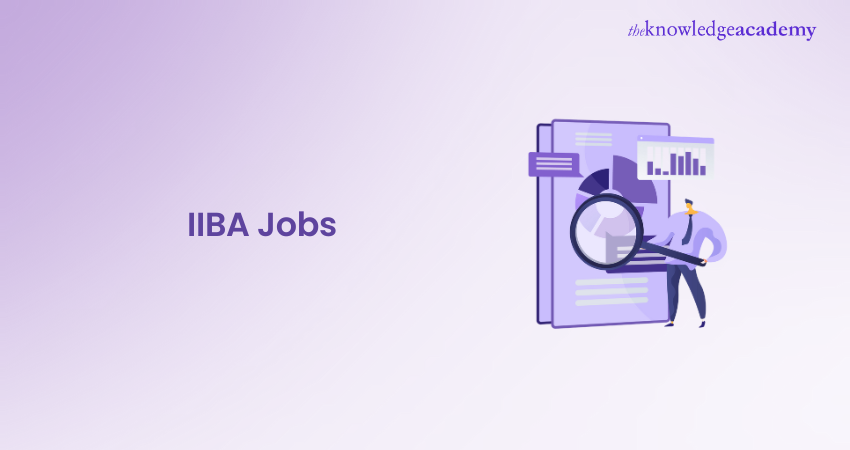
Have you ever wondered how IIBA Business Analysis Jobs can shape your career? In today’s competitive business world, organisations rely on skilled professionals to bridge the gap between goals and successful project delivery. The International Institute of Business Analysis (IIBA) sets the global standard in this field, offering certifications that open doors to rewarding opportunities.
This blog explores the importance of IIBA Business Analysis Jobs, the skills you’ll need, and how to kickstart a successful career in Business Analysis. Whether you’re experienced or just starting, discover the tools and insights to thrive in the ever-evolving world of Business Analysis.
Table of Contents
1) Understanding the IIBA: An Overview
2) Exploring IIBA Jobs - Roles and Responsibilities
3) Skills and Qualifications for IIBA Jobs
4) IIBA Certification Levels and Paths
5) Job Market Outlook and Opportunities
6) Steps to Build a Successful Career in IIBA Jobs
7) Resources and Tools for IIBA Professionals
8) Conclusion
Understanding the IIBA: An Overview
The International Institute of Business Analysis (IIBA) is a global leader in promoting excellence in the field of business analysis. Whether you're a seasoned professional or new to the industry, the IIBA offers resources, certifications, and a community to support your career growth. Here's what you need to know about the IIBA:
a) A Global Standard for Business Analysis
Founded in 2003, the IIBA sets industry standards, promotes best practices, and supports professional development worldwide.
b) The Business Analysis Body of Knowledge (BABOK)
The BABOK guide outlines essential knowledge areas, techniques, and competencies, serving as a trusted reference for business analysts.
c) Certifications to Elevate Your Career
The IIBA offers certifications like ECBA, CCBA, and CBAP, validating expertise and showcasing commitment to industry standards.
d) A Thriving Professional Community
Through local chapters, online forums, and networking events, the IIBA connects professionals and fosters knowledge sharing.
e) Training and Learning Opportunities
Conferences, webinars, and training programs help business analysts stay updated and grow at every career stage.
The IIBA is more than just an organisation; it’s a trusted partner in your career journey. It offers tools and certifications designed to help you excel in the dynamic field of business analysis.
Exploring IIBA Jobs - Roles and Responsibilities
Within the realm of business analysis, IIBA offers various Job Roles that cater to different aspects of the profession. These roles vary in their responsibilities, focus areas, and levels of expertise
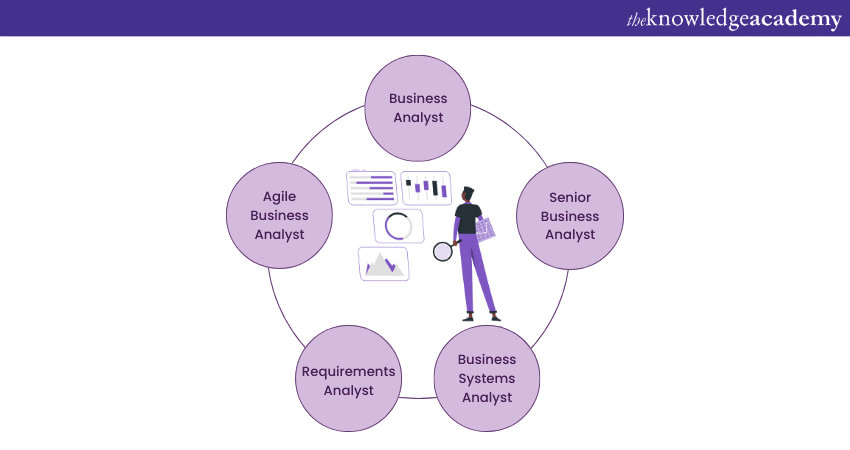
1) Business Analyst (BA): The Business Analyst is a foundational role in business analysis. BAs are responsible for understanding the business needs of an organisation, identifying problems or opportunities, and proposing solutions. They gather requirements, analyse processes, and collaborate with stakeholders to ensure successful project outcomes. BAs use various techniques such as stakeholder analysis, requirements elicitation, and business process modelling to fulfil their responsibilities.
2) Senior Business Analyst: Senior Business Analysts are experienced professionals who take on more complex projects and play a leadership role within the business analysis team. They oversee the entire lifecycle of a project, from initial scoping and requirements gathering to implementation and post-implementation support. Senior BAs provide guidance to other team members, collaborate with senior stakeholders, and ensure that business objectives are met. They may also be involved in strategic planning, process improvement, and mentoring junior analysts.
3) Business Systems Analyst: Business Systems Analysts focus on the technology aspect of business analysis. They bridge the gap between business requirements and technology solutions by identifying and evaluating systems, conducting feasibility studies, and designing functional specifications. They work closely with IT teams, stakeholders, and vendors to ensure that technology solutions align with business needs. Business Systems Analysts may also be responsible for system testing, user acceptance testing, and training end-users.
4) Requirements Analyst: Requirements Analysts specialise in gathering, documenting, and managing requirements throughout the project lifecycle. They work closely with stakeholders to elicit and prioritise requirements, ensuring that they are clear, complete, and aligned with business objectives. Requirements Analysts use techniques such as requirements workshops, interviews, and document analysis to elicit and validate requirements. They collaborate with development teams and support the traceability of requirements throughout the project.
5) Agile Business Analyst: Agile Business Analysts are professionals who work in an agile development environment, applying business analysis practices within an iterative and collaborative framework. They facilitate communication between stakeholders, development teams, and product owners, ensuring that requirements are understood and implemented effectively. By aligning with the IIBA Business Analysis Competency Model, Agile BAs contribute to user story creation, backlog refinement, sprint planning, and the continuous delivery of value to the organization. They often work closely with Scrum Masters and Product Owners to optimize the agile process.
It's important to note that these job roles can vary across organisations and industries, and some organisations may use different job titles to describe similar responsibilities. However, the underlying principles and skills required for these roles remain consistent.
Elevate your business analysis skills with our IIBA® Certification Of Competency In Business Analysis (CCBA®). Gain expertise and recognition to excel as a trusted professional.
Skills and Qualifications for IIBA Jobs
A successful career in IIBA (International Institute of Business Analysis) jobs requires a combination of technical expertise, business acumen, and interpersonal skills. Whether you are aspiring to be a Business Analyst, Senior Business Analyst, or any other IIBA job role, there are certain skills and qualifications that are highly valued in the field of business analysis.
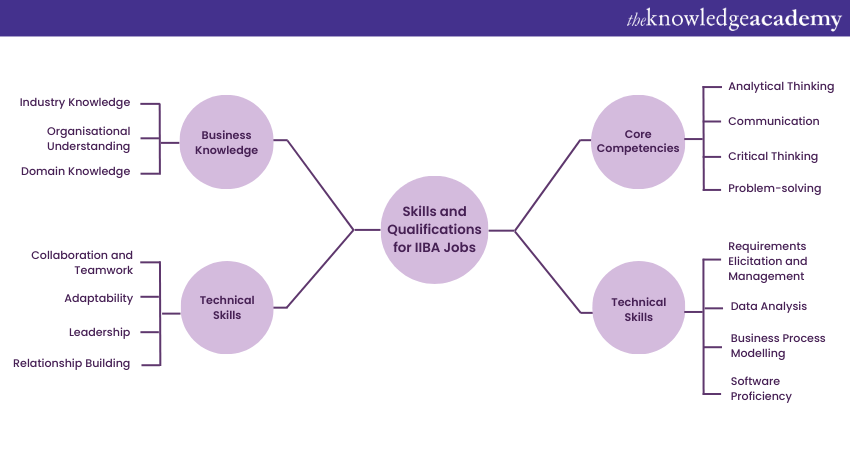
1) Core Competencies:
a) Analytical Thinking: Business analysts must possess strong analytical skills to identify problems, assess situations, and develop effective solutions.
b) Communication: Excellent communication skills are crucial for gathering requirements, facilitating meetings, and presenting findings to stakeholders.
c) Critical Thinking: Business analysts need to think critically to evaluate information, challenge assumptions, and make sound decisions.
d) Problem-Solving: The ability to approach complex problems with creativity and develop innovative solutions is essential for success in IIBA jobs.
2) Technical Skills:
a) Requirements Elicitation and Management: Business analysts should be proficient in techniques for gathering, documenting, and managing requirements throughout the project lifecycle.
b) Data Analysis: Strong data analysis skills enable business analysts to interpret data, identify trends, and make data-driven recommendations.
c) Business Process Modelling: Proficiency in business process modelling tools and techniques helps analysts map and analyse existing and future business processes.
d) Software Proficiency: Familiarity with relevant software tools, such as project management software, collaboration tools, and requirements management tools, is advantageous.
3) Business Knowledge:
a) Industry Knowledge: Understanding the industry or sector in which you work allows business analysts to contextualise requirements and provide valuable insights.
b) Organisational Understanding: Having a deep understanding of the organisation's structure, goals, and strategies helps business analysts align their work with the overall objectives.
c) Domain Knowledge: Business analysts with domain expertise in specific areas (e.g., finance, healthcare, or IT) can provide specialised insights and better support stakeholders.
4) Soft Skills:
a) Collaboration and Teamwork: Business analysts often work in cross-functional teams and need to collaborate effectively with stakeholders, subject matter experts, and development teams.
b) Adaptability: The ability to adapt to changing project requirements, priorities, and work environments is crucial in the dynamic field of business analysis.
c) Leadership: Strong leadership skills enable business analysts to guide stakeholders, influence decision-making, and drive project success.
d) Relationship Building: Building and maintaining positive relationships with stakeholders helps business analysts effectively manage expectations and navigate complex organisational dynamics.
In terms of qualifications, while a degree in business, information technology, or a related field can be beneficial, it is not always a prerequisite for IIBA jobs. However, obtaining IIBA certifications, such as the Entry Certificate in Business Analysis (ECBA), Certification of Capability in Business Analysis (CCBA), or Certified Business Analysis Professional (CBAP), can greatly enhance your credibility and marketability as a business analyst.
Additionally, gaining practical experience through internships, projects, or entry-level positions can provide valuable hands-on experience and demonstrate your ability to apply business analysis concepts in real-world scenarios.
Become a Business Analysis leader with our IIBA® Certified Business Analysis Professional (CBAP®). Advance your career and make a lasting impact in the industry.
IIBA Certification Levels and Paths
The International Institute of Business Analysis (IIBA) offers a comprehensive certification program designed to validate the skills and expertise of business analysts at different stages of their careers. The IIBA certification levels provide a clear pathway for professional growth and recognition within the field of business analysis. In this section, we will explore the different certification levels and paths offered by the IIBA.
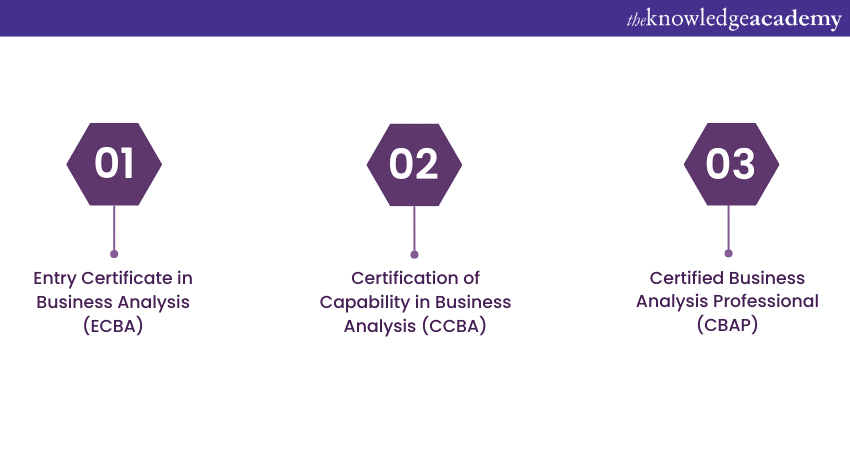
1) Entry Certificate in Business Analysis (ECBA): The ECBA is the first level of certification offered by the IIBA. It is designed for individuals who are new to the field of business analysis or those who want to gain a foundational understanding of the profession. The ECBA certification demonstrates a commitment to professional growth and provides a solid knowledge base in business analysis concepts, key terminology, and best practices. It is an excellent starting point for individuals who are looking to launch their careers in business analysis.
2) Certification of Capability in Business Analysis (CCBA): The CCBA is an intermediate-level certification aimed at business analysts with a few years of experience in the field. It recognises individuals who possess a deeper understanding of business analysis principles and have demonstrated competence in the application of these principles. To be eligible for the CCBA, candidates must meet specific work experience requirements and pass the CCBA exam. The CCBA certification showcases a higher level of expertise and opens doors to more challenging and rewarding opportunities in business analysis.
3) Certified Business Analysis Professional (CBAP): The CBAP is the most advanced level of certification offered by the IIBA and is designed for experienced business analysts who have demonstrated a superior level of knowledge and expertise. To be eligible for the CBAP, candidates must meet stringent work experience requirements. This demonstrates their competence through a detailed application and passing the CBAP exam.
The CBAP certification signifies mastery of business analysis skills, advanced knowledge of industry best practices, and the ability to lead and deliver successful business analysis initiatives. CBAP-certified professionals are often sought after for senior leadership roles and strategic business analysis positions.
It's important to note that the ECBA, CCBA, and CBAP certifications build upon one another and follow a progressive certification path. As candidates gain more experience and knowledge, they can move from one certification level to the next, demonstrating their growth and expertise within the field of business analysis.
In addition to the core certification levels, the IIBA also offers specialised certifications that cater to specific areas of expertise within business analysis. These certifications include:
a) Agile Analysis Certification (AAC): Focuses on business analysis practices within an agile context.
b) Certification in Business Data Analytics (CBDA): Emphasises the skills needed for effective data analysis and interpretation.
c) Certification in Requirements Engineering (CPRE): Focuses on the techniques and principles of requirements engineering.
These specialised certifications allow business analysts to demonstrate their proficiency in specific domains and further enhance their professional credibility.
Unlock the power of business analysis and propel your career forward with our IIBA® Business Analysis Training. Choose your path to success and register today!
Job Market Outlook and Opportunities
The field of business analysis, including IIBA (International Institute of Business Analysis) jobs, offers promising career prospects with a positive job market outlook. As organisations continue to recognise the value of effective business analysis in driving success and innovation, the demand for skilled professionals in this field is expected to grow. In this section, we will explore the job market outlook and the various opportunities available to individuals pursuing IIBA careers.
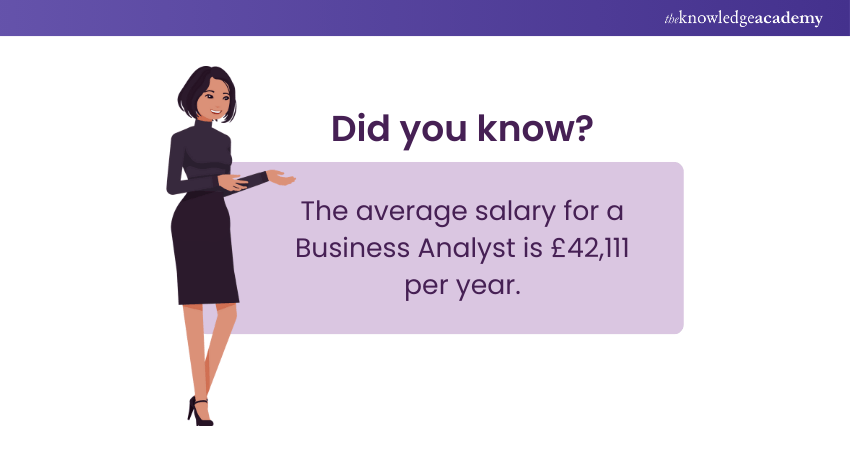
1) Growing Demand for Business Analysts: The role of business analysts is becoming increasingly vital in today's rapidly changing business landscape. Organisations across industries are realising the importance of leveraging data, improving processes, and making informed decisions. This has led to a surge in demand for business analysts who can bridge the gap between business objectives and technology solutions. Consequently, the job market for business analysts is expected to witness steady growth in the coming years, especially for those who hold Benefits of IIBA Certification.
2) Diverse Industry Opportunities: Business analysts with IIBA certifications have the advantage of working across diverse industries. Virtually every sector, including finance, healthcare, technology, retail, and government, requires business analysis expertise. This diversity opens up a wide range of opportunities for professionals to apply their skills in various contexts and gain exposure to different domains. Additionally, as new industries and sectors emerge, there will be increasing demand for business analysts to drive innovation and digital transformation.
3) Project-based Roles: Business analysts often work on projects of varying scopes and durations. This project-based nature of the work provides professionals with the opportunity to engage in challenging assignments, collaborate with cross-functional teams, and contribute to the successful delivery of strategic initiatives. This dynamic environment allows business analysts to continually learn and grow, develop their skills, and make a significant impact on the organisations they work for.
4) Leadership and Management Roles: As business analysts gain experience and expertise, they have the opportunity to advance into leadership and management positions. Business analysts' expertise in processes, stakeholders, and strategy prepares them for roles like Business Analysis Manager, Product Owner, or executive positions. These leadership roles offer the chance to shape organisational strategies, lead teams, and drive business outcomes.
5) Entrepreneurial Opportunities: Business analysts with IIBA certifications have the potential to explore entrepreneurial opportunities by providing consulting services or starting their own business analysis ventures. Many organisations, especially startups and small businesses, seek external expertise to guide their business analysis efforts. By leveraging their skills, industry knowledge, and IIBA certifications, business analysts can establish themselves as independent consultants or start consulting firms, offering their services to a diverse range of clients.
It's worth noting that the job market is highly competitive, and individuals looking to pursue IIBA careers should continuously invest in their professional development. This includes staying updated with industry trends, expanding their skill sets, and actively participating in the business analysis community through networking events, conferences, and knowledge-sharing platforms, as outlined in the IIBA Career Path Guide.
Learn Business Analysis and open new opportunities with our dynamic Business Analysis Courses. Take the first step towards becoming a skilled business analyst today!
Steps to Build a Successful Career in IIBA
Building a successful career with International Institute of Business Analysis (IIBA) certifications requires a combination of skills, knowledge, and strategic planning. Thorough preparation for IIBA Exam Questions is essential for achieving success in IIBA certification exams and building a strong foundation for a successful career in business analysis. Whether you are starting your journey in business analysis or looking to advance your existing career, following these steps can help you pave the way for a successful and fulfilling career in IIBA. Here are the key steps to consider:
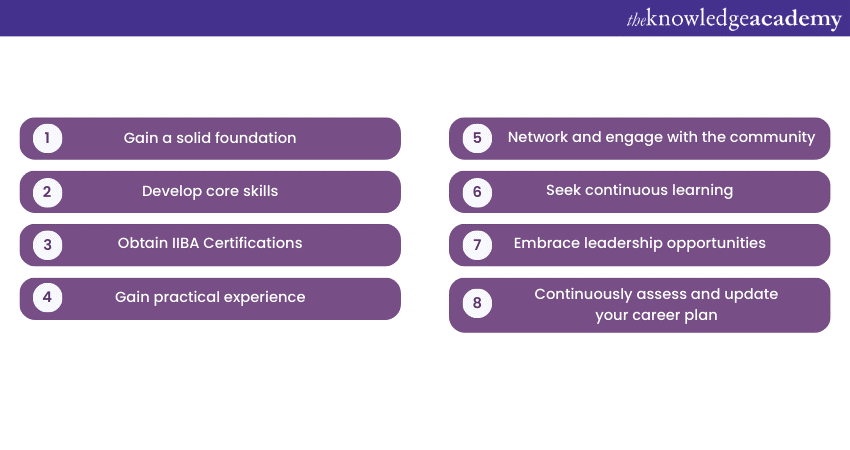
1) Gain a Solid Foundation: Start by acquiring a solid foundation in business analysis. Familiarise yourself with industry concepts, terminology, and best practices. Understand the role of business analysts in organisations and the value they bring to the table. Explore relevant resources, such as the Business Analysis Body of Knowledge (BABOK), to deepen your understanding of the discipline.
2) Develop Core Skills: Focus on developing core skills required for business analysis. These include analytical thinking, communication, problem-solving, and requirements elicitation. Enhance your technical skills in areas such as data analysis, process modelling, and requirements management. Invest in training and educational programs that align with these skill areas to build your expertise.
3) Obtain IIBA Certifications: Pursue IIBA certifications to validate your skills and enhance your marketability. Start with the Entry Certificate in Business Analysis (ECBA) to establish a foundational understanding of business analysis. As you gain experience, consider advancing to the Certification of Capability in Business Analysis (CCBA) and, ultimately, the Certified Business Analysis Professional (CBAP) certification. These certifications demonstrate your competence, commitment to professional growth and adherence to industry standards.
4) Gain Practical Experience: Seek opportunities to gain practical experience in business analysis. Look for internships, projects, or entry-level positions that allow you to apply your skills and gain hands-on experience. Engage in real-world scenarios to understand the challenges, complexities, and dynamics of business analysis. This experience will not only build your expertise but also provide valuable insights for future endeavours.
5) Network and Engage with the Community: Actively participate in the business analysis community to expand your network and stay connected with industry professionals. Attend industry conferences, join local IIBA chapters, and engage in online forums and social media groups. Networking can lead to valuable connections, mentorship opportunities, and access to job openings. Additionally, engaging with the community allows you to stay updated with industry trends and best practices.
6) Seek Continuous Learning: Commit to lifelong learning and professional development. Business analysis is a dynamic field, and staying updated with emerging trends, technologies, and methodologies is crucial. Attend training programs, webinars, and workshops to expand your knowledge. Pursue additional certifications, such as specialised certifications in agile analysis or business data analytics, to broaden your skill set and stand out in the competitive job market.
7) Embrace Leadership Opportunities: As you progress in your career, actively seek leadership opportunities. Take on additional responsibilities, mentor junior analysts, and contribute to process improvement initiatives within your organisation. Leadership skills, coupled with your business analysis expertise, will set you apart and open doors to advanced roles and greater influence in shaping business strategies.
8) Continuously Assess and Update your Career Plan: Regularly assess and update your career plan to align with your goals and aspirations. Set short-term and long-term objectives and evaluate your progress periodically. Identify areas for improvement and seek ways to enhance your skills and expertise. Stay agile and adaptable to embrace new opportunities and navigate evolving industry demands.
Step on a transformative journey into the world of business analysis with our IIBA® Entry Certificate in Business Analysis (ECBA™). Unlock new opportunities and excel in your career!
Resources and Tools for IIBA Professionals
As an International Institute of Business Analysis (IIBA) professional, there are various resources and tools available to support your career growth, enhance your skills, and stay updated with industry trends. These resources provide valuable insights, guidance, and opportunities for networking within the business analysis community. Here are some key resources and tools that can benefit IIBA professionals:
1) IIBA Website: The official IIBA website (www.iiba.org) is a comprehensive resource hub for business analysis professionals. It offers a wealth of information, including industry news, articles, whitepapers, webinars, and research reports. The website also provides details on IIBA certifications, professional development opportunities, local chapter events, and access to a global community of business analysts.
2) Business Analysis Body of Knowledge (BABOK): BABOK is a foundational resource for business analysts. It is a guidebook that outlines the core knowledge areas, tasks, techniques, and competencies necessary for effective business analysis. BABOK serves as a reference for best practices, helping professionals align their work with industry standards and expand their understanding of various business analysis domains.
3) IIBA Publications: IIBA publishes books, guides, and practice manuals to support business analysis professionals in their career journeys. These publications cover a wide range of topics, from requirements management to agile analysis and stakeholder engagement. Some notable titles include "Agile Extension to the BABOK Guide," "Business Analysis for Practitioners: A Practice Guide," and "Seven Steps to Mastering Business Analysis."
4) IIBA Chapters and Events: IIBA has a network of local chapters worldwide that organise events, workshops, and seminars. Engaging with your local IIBA chapter can provide opportunities for professional networking, knowledge sharing, and continuous learning. Chapter events often feature guest speakers, panel discussions, case studies, and interactive sessions that foster collaboration among business analysts.
5) Online Communities and Forums: Joining online communities and forums dedicated to business analysis allows you to connect with peers, seek advice, and engage in discussions on industry-related topics. Websites such as BA Times, Modern Analyst, and LinkedIn groups like the "Business Analysts Group" provide platforms for sharing experiences, asking questions, and staying connected with the wider business analysis community.
6) Tools for Requirements Management and Collaboration: Various tools can streamline and enhance the work of business analysts. Tools like JIRA, Microsoft Azure DevOps, and Trello aid in requirements management, task tracking, and project collaboration. Diagramming tools like Microsoft Visio, Lucidchart, and draw.io assist in visualising and documenting business processes. Familiarise yourself with relevant software tools that align with your organisation's requirements.
7) Professional Development Courses and Training Providers: Numerous training providers offer professional development courses specifically tailored for business analysis professionals. These courses cover various topics such as requirements elicitation, data analysis, agile methodologies, and business process modelling. Recognised training providers include IIBA Endorsed Education Providers (EEP), industry-leading training companies, and academic institutions.
8) Business Analysis Conferences and Webinars: Participating in business analysis conferences and webinars provides opportunities to learn from industry experts, gain insights into emerging trends, and expand your professional network. Notable conferences in the field include the IIBA Global Business Analysis Summit, Building Business Capability (BBC), and BA World conferences.
Conclusion
Pursuing a career in IIBA offers promising opportunities for professional growth. By following the outlined steps and utilising available resources and tools, individuals can develop the necessary skills, obtain certifications, gain practical experience, and engage with the business analysis community. The field of business analysis is in high demand, and with continuous learning and networking, individuals can build successful careers and contribute to organisational success through effective business analysis practices.
Empower your business analyst journey with our industry-leading Business Analyst Course. Gain the skills, tools, and techniques to drive successful business transformations.
Frequently Asked Questions
What is the Career Progression for a Business Analyst?

A business analyst can grow into roles like Business Analysis Manager, Product Owner, or Project Manager. With experience, they can advance to strategic roles like Business Architect or Chief Operating Officer, shaping organisational goals and strategies. Certifications and skills development are key to career growth.
What are the Key Benefits of Joining IIBA for Career Development?

Joining IIBA offers access to industry-recognised certifications, such as ECBA, CCBA, and CBAP, which validate expertise. Members benefit from resources like the BABOK guide, networking through local chapters, and learning opportunities via webinars and conferences. These tools help professionals enhance skills, connect with peers, and advance their careers.
What are the Other Resources and Offers Provided by The Knowledge Academy?

The Knowledge Academy takes global learning to new heights, offering over 3,000 online courses across 490+ locations in 190+ countries. This expansive reach ensures accessibility and convenience for learners worldwide.
Alongside our diverse Online Course Catalogue, encompassing 19 major categories, we go the extra mile by providing a plethora of free educational Online Resources like News updates, Blogs, videos, webinars, and interview questions. Tailoring learning experiences further, professionals can maximise value with customisable Course Bundles of TKA.
What is The Knowledge Pass, and How Does it Work?

The Knowledge Academy’s Knowledge Pass, a prepaid voucher, adds another layer of flexibility, allowing course bookings over a 12-month period. Join us on a journey where education knows no bounds.
What are the Related Courses and Blogs Provided by The Knowledge Academy?

The Knowledge Academy offers various IIBA® Business Analysis Training, including IIBA® Entry Certificate in Business Analysis (ECBA™) Course, IIBA® Certified Business Analysis Professional (CBAP®) and IIBA® Certification of Competency in Business Analysis (CCBA®) Course. These courses cater to different skill levels, providing comprehensive insights into IIBA Business Analysis Techniques.
Our Business Analysis Blogs cover a range of topics offering valuable resources, best practices, and industry insights. Whether you are a beginner or looking to advance your Business Analysis skills, The Knowledge Academy's diverse courses and informative blogs have you covered.
Upcoming Business Analysis Resources Batches & Dates
Date
 IIBA® Certified Business Analysis Professional (CBAP®)
IIBA® Certified Business Analysis Professional (CBAP®)
Sat 24th May 2025
Thu 29th May 2025
Sat 21st Jun 2025
Thu 24th Jul 2025
Sat 26th Jul 2025
Sat 23rd Aug 2025
Sat 20th Sep 2025
Sat 25th Oct 2025
Thu 30th Oct 2025
Sat 22nd Nov 2025
Sat 27th Dec 2025






 Top Rated Course
Top Rated Course



 If you wish to make any changes to your course, please
If you wish to make any changes to your course, please


